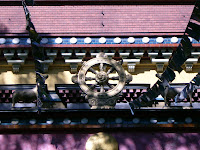Where the story starts ...
Suvannavira was born in Russia in 1967. At the age of four, after his mother had re-married to an American, he left the Soviet Union with them in 1971 for England.
His mothers new husband was a Communist and both parents were atheists whilst he was in studying in a conservative English Public school. At the age of nine he paid his last childhood visit to Russia and his family there.
In school he specialised in maths and the sciences, before going on to study Politics, Philosophy and History, first in Northern Ireland, and then Birmingham. He specialised in the relationship between the mind and the brain. Some neural connections between the two hemispheres of the brain had been severed as a treatment for the spread of Epilepsy. It was discovered that this caused a slight emergence of two centres of consciousness, one half of the brain did not always know what the other half was doing! So how could they be said to have just one mind?
After the end of his studies he went travelling for 16 months to Thailand, Malaysia, Singapore, Australia and India. This was a very significant time in his life.
"When I arrived in Thailand, the serene beauty and calm of some of the places I was in had a very profound effect on me, on my mind. I found I was able to think much more clearly, feel much more deeply, I could absorb myself much more in contemplation, in thought, and in being in the natural world. It was also a time when I was left very much alone, also, to fend for myself. For the first time it really felt that my life was very much in only my own hands".
At the end of the trip whilst in India, first in Calcutta, and the in Darjeeling and Sikkhim, he met and travelled with an Englishman who called himself Arthadarshan. He was a member of the Western Buddhist Order. It was then that he was taught, for the first time, to meditate.
"I had always wanted to learn to meditate, I always felt that the mind had greater capacities, and that meditation was a way to reach and unlock them. Buddhism also seemed to correlate with internal thoughts and experiences, to which I had not found correlation's before. As it turned out the practice of meditation also gave my mind a discipline and vigour which in turn gave my mind a much greater degree of clarity and intelligence."
Within a year of his return to the UK he had asked for Ordination into the spiritual community which is in the West is called the Western Buddhist Order, and in India the Triloka Buddha Mahasangha. He also started working for a giftware wholesaler and retailer run and staffed solely by Buddhists, as a way of living their spiritual lives together. At this time he also started the study of the ancient Indian language of Pali so he could read the oldest texts about the Buddha in their original language, and studied other Buddhist texts in English, many of which were the works of Sangharakshita, the founder of the Order.
In 1994 he was Ordained into the Western Buddhist Order/Triloka Buddha Mahasangha during a 16 week retreat in a seduced valley in the south of Spain. He was given name in Pali of Suvannavira; Suvanna meaning golden or beautiful, and Vira meaning a strong or heroic man.
Towards the end of the nineties he started to have more contact with Russia again, he found members of his family on the internet after not having contact for nearly 30 years. He started to read Russian history of the late 19th and early 20th century, and especially Solzhenitsyn's epic on the revolution 'the Red Wheel'. He returned to native soil for a week long retreat led by Kamalashila, another member of the Western Buddhist Order, at Oranienbaum (near St Petersburg). At this time he also changed his non-Buddhist name back to the Russian, and started to re-learn Russian again.
After 11 years in the gift business he decided also that it was time to devote more time to teaching meditation and Buddhism, and to change countries! So in 2002 he arrived in Paris to work and teach at the 'Centre Bouddhiste Triratna de Paris'.
Just before his arrival in Paris he paid a 6 week visit to Russia, passing through Helsinki and Tallinn. He visited St Petersburg, Moscow, seeing childhood residents and family again. He also travelled to Siberia, to the Chita region, to visit Buddhist monasteries and datsans there of the Buryat people at Aginsk and Tsygolski. The Buriyat people were practitioners in the Gelug school of Tibetan Buddhism. He did a two week solitary retreat in the forests near the sacred Mount Alhanai, which was considered considered a natural mandala. He travelled back to European Russia from Chita, Buryatia, past lake Baikal on the Trans-Siberian Express.
He visited again in 2003 leading his first retreat on Russian soil, near St Petersburg.






